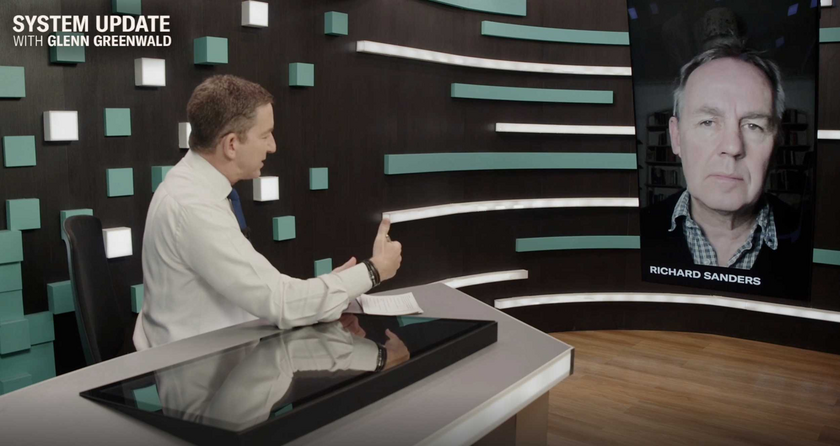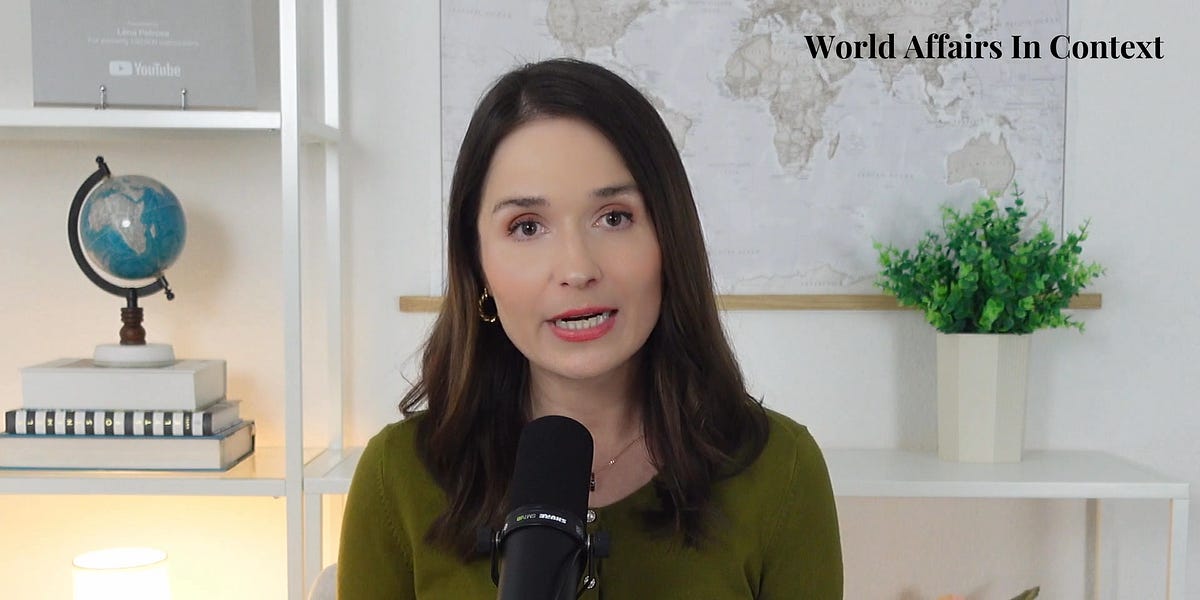Watch the full episode HERE
Good evening. It's Friday, October 11.
Tonight: The total Israeli destruction of civilian life in Gaza is now more than a year old. Even those who have been closely following the devastation and indiscriminate killings of tens of thousands of civilians by Israel have a hard time, I think, truly synthesizing the scope and magnitude of the barbarism, sadism, and decadence that has driven Israel's behavior. Fortunately, a new and genuinely great documentary produced by Al Jazeera and directed by the longtime British journalist Richard Sanders has just been released and is available to watch. That fully provides a complete and sometimes difficult-to-endure historical record of what has really been done to the people of Gaza – all with the direct, vital, indispensable support of the West in general and the U.S. in particular – entitled “Investigating War Crimes in Gaza.”
The one hour and 20-minute film heavily relies not simply on the words of the Palestinians or even on the videos that they recorded, but very much so on the words of IDF soldiers in Gaza, including many of the repulsive and degenerate videos, so many of them routinely posted, of what they were doing to civilian infrastructure in Gaza and why they were destroying it. What has been done by Israel and the U.S. in Gaza and to Gazans for a full year should never be forgotten or even minimized and watching this documentary will ensure that never happens.
The documentary can be seen in full on both the Al Jazeera English site and their YouTube channel. We asked the director, Richard Sanders, to come and talk about how and why he made this film, what evidence it relies upon, and also discuss some of the revelations that will be new to many people – It was to me, even to those carefully following this attack on Gaza day by day, such as, for example, the incomprehensible horrors endured by Gazans every time the Israelis ordered them to, quote, “evacuate” one area of Gaza and move to another. What makes Sanders such an interesting figure to have directed this film is that he has spent much of his career not working on the fringes but working in the heart of mainstream British media. Our interview with him contains some truly interesting insights about what both this documentary reveals and how it was made.
As soon as our interview with him ends, we will show you the first 15 minutes of the documentary with the permission of Al Jazeera – not in the hope that this will satiate your interest in the film, but the opposite. Well, we do it with the hope that it will motivate you to watch the whole thing, which I promise you is very well worth your time.
For now, welcome to a new episode of System Update, starting right now with my interview with Richard Sanders about his great new documentary.
Interview with Richard Sanders

G. Greenwald: Richard, thank you so much for taking the time to talk to us. Congratulations on this very important documentary. And we are excited to talk about what went into it and everything else. So, we're delighted to have you.
Richard Sanders: Thank you very much. Thank you for having me.
G. Greenwald: Sure. So, as a journalist, there have been a lot of things I've covered that have been really excruciating and awful to write about, but then also to witness. And I know in the past, once I felt like I had an understanding of the extent of the horrors and suffering entailed by whatever I was writing about, I always found myself wanting not to look anymore just because it almost seemed like gratuitous suffering. And there have obviously been a lot of people watching and talking about and reporting on the atrocities that have been taking place in Gaza over the last year. This film, I think, does a remarkable job of synthesizing it, putting it into a whole narrative. But a lot of it is extremely difficult to watch. So, what is it that you feel that this documentary adds that people who've been following all along maybe haven't quite gotten yet?
Richard Sanders: Well, if you've been following it all along on Western media [laughs], I think it adds an awful lot. I mean, for people who've been following it on the sort of sites and news outlets that you and I perhaps follow, then as you say, I think it synthesizes it and brings it all together. I think it was inspired by two things: one is the desire simply not to leave the space to Western media outlets to cover this because they do it so appallingly but also, this realization that there was this extraordinary resource out there. You have this extraordinary phenomenon of Israeli soldiers posting videos of themselves continuously which were completely candid. They seem to have no sense of shame and a complete sense of impunity. It struck us this was quite an extraordinary and unique source for being able to tell the story of a conflict.
G. Greenwald: Yeah, and I want to get into that a lot because, obviously, I know when defenders of Israel hear that Al-Jazeera has any role in anything, they immediately dismiss it as unreliable or antisemitic. You know, all the accusations that are hurled. But in this particular case, so much of what your reporting relies not upon even necessarily Gazans or critics of Israel, but what IDF soldiers themselves have said and shown about their own conduct in the war and I want to get to that in just a second. But before I get to that, there was a woman in Gaza who is a journalist with Al-Jazeera, and she described the last year as being, quote, “the first-ever live-streamed genocide” and I think clearly beyond what the IDF has shown, one of the differences in this war as compared to almost any other is the Israelis tried to keep journalists out. The ones that were there, they tried to kill but they couldn't prevent real-time videos taken by the people there. How much of that did you rely on and how were you able to confirm that what you were seeing was, in fact, what was purported to be shown?
Richard Sanders: We relied heavily on Al Jazeera footage when Al Jazeera has been in there all this time. And so, we rely very heavily on that footage. You're right, we do rely on stuff shot by Palestinians in Gaza. I mean, unlike the BBC and ITV, I think here, in Britain, we don't start from the presumption that they're trying to get one over on us. You just have to look at the footage. And they've set up the most extraordinary movie sets if it is false. Now, there are one or or two videos you sense are a little bit contrived and we have you know, we have Palestinians working on the team who are very tuned into these things, and we filtered out a few. But on the whole, I mean, if you're looking at a ruined landscape and shredded bodies, I don't know what else you're looking at but the truth.
G. Greenwald: Before we get into the substance, let's talk a little bit about the film, how it was produced, who was behind it, who financed it because whenever there's a report or any kind of document that in any way reflects negatively on Israel, there is immediately an attempt to discredit it as some kind of propaganda against Israel. Can you talk a little bit about who worked on this project, who financed it, where it came from, and who kind of oversaw it?
Richard Sanders: Okay. So, I made it. I'm a freelance journalist. I've made about 60 films for British television, primarily for Channel 4, but also for the BBC. I've made a lot of dispatches for Channel 4 and the people who worked on it are the superb team at the investigative unit at Al-Jazeera. So, Al Jazeera funded, its Al-Jazeera production, specifically the investigative unit, and some excellent freelancers we've brought in as well.
G. Greenwald: One of the things that caught my attention about your work in particular, to your involvement in this, is that a lot of times people who are willing to be so harshly critical of the Israeli military or Israeli policy are people who are in some sense already kind of marginalized. They're people who are already on the fringes. They don't have a lot to fear. One of the things that's so notable about your work, your body of work over many years, is that as you just got done saying, you've done a lot of your work for some of the most mainstream and well-regarded media institutions in the U.K. For those who don't know, Channel 4 News is among those. Obviously, the BBC, The Daily Telegraph, and many of these institutions that are among the most mainstream and established in the U.K. are ones with which you've had a relationship. What were your thoughts on possible implications on your career or your standing inside the British media world by having overseen a documentary of this kind?
Richard Sanders: It is true if you step out of the frankly very peculiar consensus there is about Israel in the West, you do come to be regarded as a marginal figure and it's quite tricky when you're trying to pick people to interview because you attract people down and you talk to them and think they're very interesting. Then you suddenly discover they're regarded as very marginal. When we interviewed Andreas Krieg in our film, in a fascinating moment, a security expert; he was on the BBC last week saying the same sort of things he said to us, just sort of rational analysis and it provoked an absolute firestorm. It was, you know, and he was heaped with abuse and so on. In terms of myself, Al Jazeera is continuing to employ me for the moment. So, we'll see how it goes.
G. Greenwald: One of the things that I'm always interested in is sort of the idiosyncrasies of British political culture because it goes back so many years. It has a lot to do with centuries-old animosities between various countries, a residue of the British Empire in a way that I think a lot of people outside the U.K., certainly in the U.S., don't quite fully understand. And there have been over the last several years things involving Jeremy Corbyn and other incidents like that, very clear expressions of just how strong the pro-Israel consensus in the U.K. is, not just in the Labor Party but in the Tory Party and just in the general media establishment as well. Why is that? Why is the U.K. so devoted to and intense about defending Israel or justifying what it does?
Richard Sanders: I mean, it's interesting you put that point. I don't think it's worse than America. It's certainly not worse than Germany. I think it's a broader question, and I think it's a fascinating question: why is the Western media-political establishment so enthralled with this very small and very questionable country? And I think one of the fascinating things here – and here I can speak for Britain specifically – there's a problem in Britain generally at the moment that the media-political class, which is very much a club in Britain at the moment, is very out of touch with the general public. You just have to analyze the figures in elections and so on. There's a real problem there, but it's massively out of touch on this issue. So, you watch British media, you listen to British politicians, and yes, you would think Britain is a slavishly pro-Israel country. You look at the opinion polls and that's not the case at all, and what support there is for Israelis is deteriorating sharply.
G. Greenwald: I just want to ask you, on that last question, obviously, there have been books written about what's called the Israel Lobby, including by very respected scholars like John Mearsheimer and Stephen Walt, who were the first to, I think, really kind of have the courage to document it, one at Harvard and one at the University of Chicago. But there's been a lot of revelations about the ability of pro-Israel activists to kind of influence political parties in mainstream political parties in the West far beyond what their numbers might suggest they're able to do. Oftentimes, this is a taboo topic, people like to write it off as antisemitic. And it can actually, I think, fall into that trap at some point. But in terms of the U.K. and other places, what role do you think that plays in that question you raised? Namely, why is it that the West is so enthralled with and so devoted to this kind of tiny little country on the other side of the world?
Richard Sanders: Well, the first of the three films I made for Al-Jazeera was the second episode in the Labor Files, where we picked apart this whole extraordinary antisemitism crisis around Jeremy Corbyn, who was a radical left leader of the Labor Party. And there I very much came to the conclusion that, yes, the Israel lobby is very powerful. The thing was it tapped into the vested interests of a whole range of groups. I mean, there was an enormous range of groups, most particularly the security establishment, that really, really didn't want Jeremy Corbyn to be a prime minister. And the Israel lobby is powerful but it ain’t that powerful and these groups all came together essentially. And it was the perfect weapon to beat him with because it left him, you know, it was a man who spent his life combating racism and it rather left Jeremy Corbyn disarmed. He appeared to be totally powerless to fight back against it and it proved an immensely effective weapon. Not that I think an awful lot of people were very puzzled by it. They didn't really get why Jeremy Corbyn was supposed to be an anti-Semite. What they did get, though, was that the Labor Party had this problem. It was being criticized day after day and it wasn't pushing back. It was doing this makeover and sort of squirming around. And what people got was there was a problem and the Labor Party couldn't solve it. It was a very effective weapon to destroy Jeremy Corbyn. So, it's yes, you have the Israel lobby people who are intent on pushing the interests of Israel and delegitimizing the Palestinian cause, very often because the people they are targeting are the radical left and increasingly just the broader left. Then, there are other people who have a very vested interest in jumping on the bandwagon.
G. Greenwald: Yeah, I think the way Jeremy Corbyn responded, instead of being very aggressive and rejecting the idea or even showing of great offense that he is antisemitic or would tolerate antisemitism, instead constantly feeding into it, like, yes, there's a problem, but I'm fixing it, I'm working on it unintentionally, but very much in line with Corbyn's character, which I think is a big part of what enabled that to succeed. But that's for another day.
All right. Well, let's get to this documentary, and some of the more specific aspects of it although I began by saying I think people paying attention to this intently and not just through the Western press might have known a lot about it, even though this documentary, watching it all at once kind of gives you a newfound sense of just how extreme these sufferings and atrocities have been. One of the things that I felt like was new was a lot of the information about what these, quote-unquote, “evacuation” orders entail. We were constantly hearing almost as though it was like a humanitarian thing that the IDF would order civilian populations to evacuate the area they were about to attack. And in the West, that got depicted as look, the IDF does something that no other military does, which is it warns the civilians about where the bombing is coming and it tells them to leave. And yet a lot of these, quote-unquote, “evacuations” were not just extremely arduous, but themselves very violent, very deadly, very brutal. Can you talk a little bit about what it is that this film was able to reveal about just that part of it?























